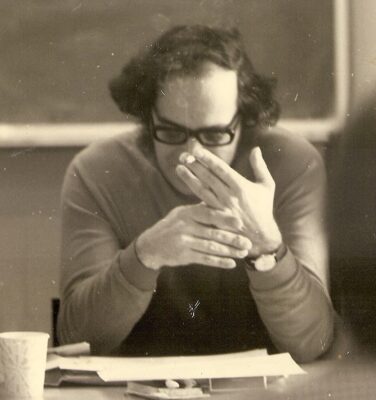Cathy Legg has presented a most interesting piece in Agora Ideas, namely ‘When the Day Before Yesterday Is Actually Today,’ which traces how a question about gender parity, which still remains a question, had been declared as ‘sorted out’ or more or less concluded, progressively throughout recent history. She notes that, in 1989, Michèle Le Dœuff declared the issue ‘more or less closed’ when quoting Simone De Beauvoir who, some forty years earlier still had claimed the ‘the issues had been sorted out now.’
This pattern of regularly locating ideal states and situations a generation or so back in the past, ‘the day before yesterday,’ has been referred to as a ‘cultural tendency’ by Raymond Williams in his book The Country and the City; and to illustrate it he whimsically traces the nostalgia for the ‘organic community’ back through the generations from F. R. Leavis’s notorious 1930 pamphlet ‘Mass Civilisation and Minority Culture’ through to Oliver Goldsmith’s 1770 poem ‘The Deserted Village.’ I think we can do the same for the university.
Like many readers of PESA Agora, I retired from my university position much earlier than I was required to or needed to physically and/or mentally; and, as I look back on what I have done in the two decades since, I suspect I retired at or very near to the peak of my abilities. To paraphrase Norma Desmond in Sunset Boulevard, I think what I was doing at university was big (still important); it was the university that had got small (changed).
I started university as an undergraduate in the mid-1960s, became a junior academic in 1968 and stayed until the year 2000. The early days at least, I thought, were smack bang in the middle of the university’s heydays, when student, staff and community life seemed exciting and vibrant, at least from where I stood, before beginning a fast decline in the 1980s However, examination of the relevant literature indicates that the decline may have started even earlier. Masha Eisenberg, in her mammoth university-sponsored study of the student experience at Sydney University, Students, Staff and University: A Study of Teaching and Learning in the Faculty of Arts (1970-1973), found that the most common phrase, by far, used by students in their interviews was ‘When I get out….’ Both students and staff were using the language of the prison. It seems as though, despite my rose-tinted view, universities must have been something better (nobody freely or willingly enters a prison), some time before that. Maybe in the 1950s or ’60s?
So, let’s go back to the 60s and see what was being said then. Oops! 1960 was the year that Clark Kerr, President of Harvard University, declared that ‘Universities were no longer communities of scholars but had become havens of squabbling academics united by a common grievance over parking.’* Kerr quite openly yearned for a return to the university of the ’30s, but that was the university inhabited by the highly distinguished Professor R. M. Hutchins, who described it as no longer a purveyor of liberal education but rather ‘a series of separate schools and departments held together by a central heating system.’
Hutchins himself had a yearning for the turn of the century university. However, novelist, schoolteacher and student (in reverse order) D. H. Lawrence noted in 1915 that that university merely ‘pretended to exist by the religious virtue of knowledge[, while] the religious virtue of knowledge had [already] become a flunkey to the god of material success.’ Lawrence, the novelist, chose his words carefully. He was looking back to the ‘day before yesterday’ writings of Cardinal Newman, who, in The Idea of a University (1852, 1858) also had one eye on a rear-view mirror; and so the story can be continued all the way to Socrates who set up his soap-box in the Agora of BC Athens, probably in part through disillusion with the present and some level of yearning for ‘the day before yesterday.’
I can only wonder if students and academics of the future will look back on the present university – with its dumbed down courses, relaxed entry requirements, soft marking, little concern about academic misconduct such as cheating and plagiarism, the unethical privileged treatment afforded to full-fee paying overseas students, the privileging of money-generating research over both the Humanities, in particular, and good teaching, in general, and the basic corporatisation of the institution as an entity – and yearn for ‘the day before yesterday.’ If so, what sort of living Hell would they be experiencing?
* [Ed.] Actually, according to Time magazine, it was in a speech in 1958 at the inauguration of a new President of the University of Washington that Clark Kerr said, ‘I find that the three major administrative problems on a campus are sex for the students, athletics for the alumni and parking for the faculty.’ In his book The Uses of the University (1965/2001), he describes thinking of the university as ‘a series of individual faculty entrepreneurs held together by a common grievance over parking.’





